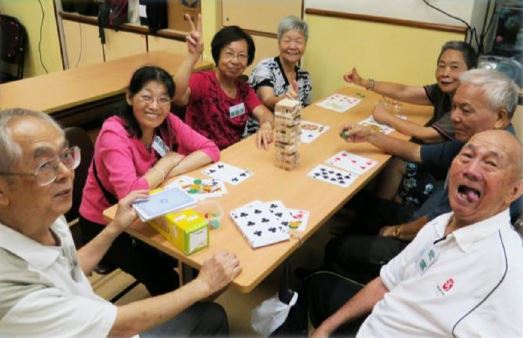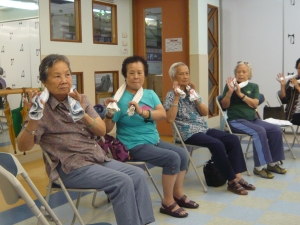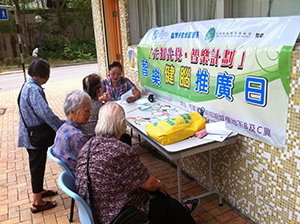
Active Prevention & Early Detection of Cognitive Impairment (“APEC”)
Since 2008, the Elderly Fund has committed itself to the area of dementia care and promotion of “Early Detection and Early Intervention”. Under the Active Prevention & Early Detection of Cognitive Impairment project (“APEC”) (previously called Awareness, Prevention and Early Detection of Cognitive Impairment project), we partnered with The Chinese University of Hong Kong and NGOs to develop an evidence-based service model with proven effectiveness in slowing down cognitive deterioration. Now, the Model has been rolled out to 75 elderly centres over 17 districts (less The Islands) in Hong Kong, helping elders with mild cognitive impairment to preserve cognitive and brain functioning. More than 2700 elders have benefited.
Funding amount (research, service and capacity building): $20.9M
To see the full list of NGO partners participated in the five phases of the APEC project, please click here.
Dementia as Critical Social Issue
Over 10% of the population aged 70 years or above in Hong Kong suffers from clinical dementia – a brain disorder which interferes intellectual functioning and normal life functions. As the population ages, the number of people with dementia will surge, imposing heavy burden on families, health care system and the economy. Dementia is incurable and progressive, yet early intervention, both medical and non-medical, can help slow down the deterioration and ease the stress of the patients and their families. However, awareness on dementia is low in Hong Kong. Only 10% of dementia cases are diagnosed, resulting in delayed treatment.
Early Detection and Early Intervention
Since 2008, the Simon K Y Lee Elderly Fund (“the Elderly Fund”) has worked with NGOs and the academia to promote “Early Detection and Early Intervention” through social service, research and public education. Three phases of the Active Prevention & Early Detection of Cognitive Impairment Project (先知先覺® – 認知障礙預防計劃) (“APEC”) (previously called Awareness, Prevention and Early Detection of Cognitive Impairment Project) have been introduced. APEC targets people with mild cognitive impairment (“MCI”) and very mild cognitive impairment (“VMCI”) – they suffer from reduced cognitive abilities such as memory loss, language disturbance and attention deficit. Their conditions are not bad enough to be defined as dementia but the risk of developing into this incurable disease is higher than normal people. APEC aims to identify these elders in the community and provide for them early interventions so as to slow down cognitive deterioration, reduce the risk of dementia and delaying the onset.
Finding the Solution – Evidence-based Service Model
 To find an intervention which can effectively improve cognitive functioning and reduce the risk of dementia, the Elderly Fund commissioned Prof Linda Lam, Chairman and Professor of the Dept. of Psychiatry of The Chinese University of Hong Kong in 2011 to conduct a research in the 2nd phase of APEC. APEC emphasizes on the regularity and frequency of activities. In order to encourage habit formation, participating elders are asked to take part in three 1-hour activities a week which include a combination of physical exercise or cognitive training. Over 550 MCI and VMCI elders were recruited through three NGOs (Baptist Oi Kwan Social Service, Haven of Hope Christian Service and Hong Kong Sheng Kung Hui Welfare Council) to undergo structured cognitive and physical activities for one year. These elders were assessed periodically and the results indicated an overall improvement in their cognitive functions. Thus, an evidence-based model is established. It is proved to be effective in slowing down elders’ cognitive deterioration, as well as feasible and can be implemented by NGOs in community level.
To find an intervention which can effectively improve cognitive functioning and reduce the risk of dementia, the Elderly Fund commissioned Prof Linda Lam, Chairman and Professor of the Dept. of Psychiatry of The Chinese University of Hong Kong in 2011 to conduct a research in the 2nd phase of APEC. APEC emphasizes on the regularity and frequency of activities. In order to encourage habit formation, participating elders are asked to take part in three 1-hour activities a week which include a combination of physical exercise or cognitive training. Over 550 MCI and VMCI elders were recruited through three NGOs (Baptist Oi Kwan Social Service, Haven of Hope Christian Service and Hong Kong Sheng Kung Hui Welfare Council) to undergo structured cognitive and physical activities for one year. These elders were assessed periodically and the results indicated an overall improvement in their cognitive functions. Thus, an evidence-based model is established. It is proved to be effective in slowing down elders’ cognitive deterioration, as well as feasible and can be implemented by NGOs in community level.
Press Conference Announcing the Research Result
Arousing Community and Public Awareness
 In addition to activity intervention for MCI and VMCI elders, the first two phases of APEC provided a series of programme to promote “Early Detection and Early Intervention” in the community. They include preliminary assessments, talks, street exhibitions, carer training, counselling and volunteer training etc. Over 60,000 man-times participated, 8,000 elders were assessed and 650 volunteers were trained.
In addition to activity intervention for MCI and VMCI elders, the first two phases of APEC provided a series of programme to promote “Early Detection and Early Intervention” in the community. They include preliminary assessments, talks, street exhibitions, carer training, counselling and volunteer training etc. Over 60,000 man-times participated, 8,000 elders were assessed and 650 volunteers were trained.
Slideshows from the three NGO partners of APEC I and II:
Baptist Oi Kwan Social Service
Haven of Hope Christian Service
Hong Kong Sheng Kung Hui Welfare Council (1)
Hong Kong Sheng Kung Hui Welfare Council (2)
To further spread the message and raise public awareness on dementia, the Elderly Fund launched an education campaign in 2011 to 2012. Media initiatives such as TV infotainment, newspaper column and radio programmes were utilized to encourage the public, especially the middle-aged population, to take their elders to receive assessments.
Amplifying the Solution
 To advocate MCI service in the welfare sector and make good use of the APEC Model, the Elderly Fund launched the 3rd phase of APEC in late 2013. 11 NGOs were funded to implement the APEC Model in their 44 service units over 16 districts in Hong Kong, Kowloon and New Territories. About 1000 MCI and VMCI elders were engaged to undergo cognitive and physical activity intervention for one year. Besides, carer support, preliminary assessments and community education were provided, and a new element was added. Over 200 young-olds aged 50 to 70 were engaged and trained to volunteer for the project. This is not only to provide peer support for the elderly participants, but also to promote “active aging” as advocated by the Government.
To advocate MCI service in the welfare sector and make good use of the APEC Model, the Elderly Fund launched the 3rd phase of APEC in late 2013. 11 NGOs were funded to implement the APEC Model in their 44 service units over 16 districts in Hong Kong, Kowloon and New Territories. About 1000 MCI and VMCI elders were engaged to undergo cognitive and physical activity intervention for one year. Besides, carer support, preliminary assessments and community education were provided, and a new element was added. Over 200 young-olds aged 50 to 70 were engaged and trained to volunteer for the project. This is not only to provide peer support for the elderly participants, but also to promote “active aging” as advocated by the Government.
In 2016, the Elderly Fund launched the 4th phase of APEC (“APEC IV”) in order to promote and spread the Model to more NGOs and districts. 8 NGOs were funded to deliver the programme in 18 units in APEC IV. APEC IV aims to serve over 500 MCI elders, and engage over 130 young-olds to become volunteers for the project. The 5th phase of APEC (“APEC V”) was launched in 2017. 13 NGOs delivered the programme in 40 units, benefiting over 650 MCI elders.
After all 5 phases, the APEC Model has been promoted and programmes have been organized in 17 districts (less The Islands) across Hong Kong, partnering with 31 NGOs and 88 service units.
The Third to Fifth Phases of the Active Prevention & Early Detection of Cognitive Impairment Project:
| NGO Partners of APEC III | NGO Partners of APEC IV | NGO Partners of APEC V |
|---|---|---|
| 1. Association of Baptists for World Evangelism (HK) Limited | 1. Caritas | 1. Association of Baptists for World Evangelism (HK) Limited |
| 2. Baptist Oi Kwan Social Service | 2. Chinese Young Men’s Christian Association of Hong Kong | 2. Fung Kai Neighbourbood Elderly Centre |
| 3. Helping Hand | 3. Christian & Missionary Alliance Church Union of Hong Kong | 3. Hong Kong – Macao Conference of Seventh-Day Adventists |
| 4. Hong Kong – Macao Conference of Seventh-Day Adventists | 4. Hong Kong Young Women’s Christian Association | 4. Hong Kong Christian Service |
| 5. Hong Kong Christian Mutual Improvement Society | 5. Lam Tin Estate Kai Fong Welfare Association | 5. Hong Kong Lutheran Social Service, The Lutheran Church – Hong Kong Syod |
| 6. Hong Kong Lutheran Church – Hong Kong Syod | 6. LCH Charitable Foundation | 6. Kwun Tong Methodist Social Service |
| 7. Methodist Centre | 7. Women’s Welfare Club, Western District | 7. LCH Charitable Foundation |
| 8. Po Leung Kuk | 8. Yan Oi Tong | 8. Light and Love Home Limited |
| 9. The Chinese Rhenish Church Hong Kong Synod | 9. Methodist Centre | |
| 10. The Neighbourhood Advice-Action Council | 10. New Territories Women & Juveniles Welfare Association Limited | |
| 11. The Tsung Tsin Mission of Hong Kong Social Service Company Limited | 11. Po Leung Kuk | |
| 12. Sai Kung District Community Centre | ||
| 13. Yan Oi Tong | ||
Sustaining the Impact / Publishing the Manual
To further promote and sustain the impact of the established APEC model, the Fund has developed and published the APEC Manual (“the Manual”), which is a useful implementation and reference guide for those who are interested to learn more about the APEC programme and how it can benefit elders with MCI to delay onset of dementia. The Manual includes background information about MCI, the APEC Model and relevant concepts, as well as step-by-step action guide for prospective NGOs and other parties to organize activities under the APEC Model framework.
If you are interested to access the Manual, please right click here (save link as) to download and fill out the Request for Access form. The Fund will provide the Manual document and the access password to the applicant once it has reviewed and approved the application(s).

